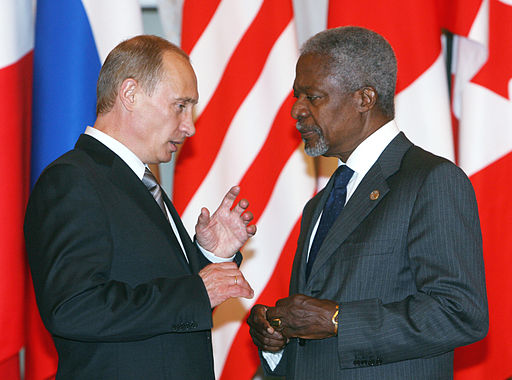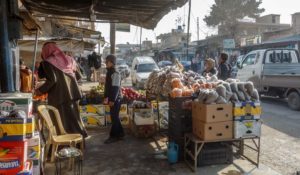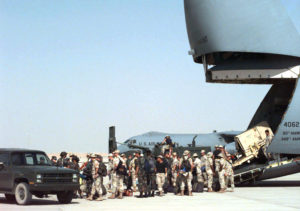
![Vladimir Putin with Kofi Annan by Kremlin.ru [CC-BY-3.0 (http://creativecommons.org/licenses/by/3.0)], via Wikimedia Commons Vladimir Putin with Kofi Annan](https://muslimvillage.com/wp-content/uploads/2012/06/512px-Vladimir_Putin_with_Kofi_Annan-3.jpg)
World powers meet Saturday in a desperate bid to salvage international envoy Kofi Annan’s peace plan for Syria to end 16 months of bloodshed and agree on a transition plan for the strife-hit country.
Ahead of the multi-nation talks in Geneva, a meeting in Russia between US Secretary of State Hillary Clinton and Russian Foreign Minister Sergei Lavrov led Moscow to issue an upbeat outlook, saying a deal was likely.
But Washington took a more cautious line, warning of persistent differences between the US and Russian approaches and dampening hopes of progress needed to stop the conflict that according to rights monitors has left 15,800 people dead since March last year.
Annan had announced the Geneva meeting on Tuesday, inviting Clinton, Lavrov, and the foreign ministers of the three other permanent Security Council states Britain, China and France, as well as regional powers Qatar, Turkey, Kuwait and Iraq, but conspicuously leaving out Iran and Saudi Arabia.
He circulated a proposal on a “Syrian-led transition” that could help save his peace process that has been largely ignored by both the ruling regime and opposition since it came in force on April 12.
Fighting has only intensified in recent weeks and rights monitors said more than 230 people — most of them civilians — had been killed across the strategic Middle East country since Thursday.
But doubts grew over the fate of Saturday’s meeting as it drew nearer, over Russian opposition to Annan’s proposal on the composition of an interim Syrian government.
Annan’s draft, seen by AFP, sees power handed to an interim Syrian team without those “whose continued presence and participation would undermine the credibility of the transition and jeopardise stability and reconciliation”.
The wording appears to imply — without saying so directly — that Syrian President Bashar al-Assad would have to relinquish his grip on power for the idea to succeed.
Russia angrily rejected the suggestion, insisting that Assad’s fate “must be decided within the framework of a Syrian dialogue by the Syrian people themselves,” while Western powers warned there was no point meeting in Geneva if there was no prior agreement on the issue.
But after Friday’s talks with Clinton, Lavrov said he “detected a shift” in Washington’s approach to ending the bloodshed that no longer involved a specific demand for Assad to leave.
“There were no ultimatums. Not a word was said about the document now being discussed in Geneva being completely untouchable,” Lavrov told reporters in reference to wording that suggest no future role for Assad.
“I can confidently say that we have a very good chance tomorrow in Geneva to find a common denominator and mark a path forward,” Lavrov added.
“We agreed to find a consensus that rests on a clear understanding… that the Syrian sides must be stimulated toward dialogue, but that the decision to what the state looks like and who occupies which posts can only be decided by the Syrians themselves.”
A conflicting message came from Lavrov’s deputy, Gennady Gatilov, who tweeted early Saturday that experts in Geneva had thus far failed to agree to the wording of a final document on Syria because “the Western partners want to determine the political process themselves.”
The US account of the Lavrov-Clinton meeting was also more measured and appeared to suggest little agreement on the future of Assad.
A senior US State Department official noted some progress while conceding that “there were still areas of difficulty and difference” between the approaches of Russia and the United States.
“But out of respect to Kofi Annan, they agreed we should all go to Geneva tomorrow to try to produce a result,” said the official.
In an editorial published Saturday in Swiss newspaper Le Temps, Annan said that as the “conflict is between Syrians, it is up to the Syrians to resolve it.
“But it would be naive to think that they can, on their own, end the violence today and engage in a real political process.”
Iran’s UN ambassador Mohammed Khazaee criticised the exclusion of Tehran from the meeting, hitting out at Western powers, particularly the United States, for ignoring the “power and influence of Iran”.
The United States and European nations opposed the presence of Iran, a long time ally of Assad. Diplomats said Russia opposed Saudi Arabia because of its support for the Syrian opposition.






